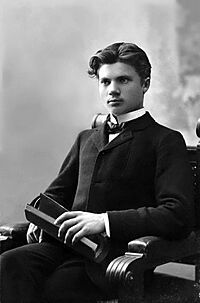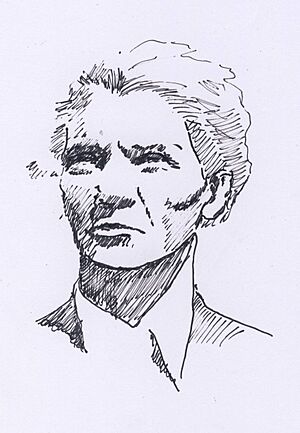Juhan Simm facts for kids
Quick facts for kids
Juhan Simm
|
|
|---|---|
 |
|
| Born | 12 August 1885 Kivilõppe, Kreis Fellin, Governorate of Livonia
|
| Died | 20 December 1959 (aged 74) |
| Nationality | Estonian |
| Occupation | Composer, conductor |
| Years active | 1906–1959 |
Juhan Simm (born August 12, 1885, died December 20, 1959) was an important Estonian composer, conductor, and choir leader. He helped shape Estonian music, especially through his work with choirs and the famous Estonian Song Festivals.
Contents
Early Life and Education
Juhan Simm was born in a village called Kivilõppe, which was part of the Russian Empire at the time. He went to local schools in Suislepa and Tarvastu. Even when he was studying physics and math at the University of Tartu from 1906 to 1910, he discovered his strong love for music.
Musical Journey
In 1908, Juhan Simm started the Tartu male choir, which was a big step in his musical career. He began conducting choirs in 1912. To improve his skills, he traveled to Berlin, Germany, from 1912 to 1914. There, he studied conducting and composition at the Stern Conservatory, a well-known music school. Later, in 1924, he went to Paris, France, to learn even more about conducting at the Grand Opéra, a famous opera house.
Work and Influence
Juhan Simm worked at the Vanemuine theatre and concert hall in Tartu for many years. From 1914 to 1916, he was the musical director there. He also led the local male choir from 1916 to 1925 and was a conductor from 1916 to 1940.
Simm also shared his knowledge with others. He taught conducting, music education, and music theory at the Music School of Tartu during different periods. He also started and led several choirs across Estonia.
Estonian Song Festivals
Juhan Simm played a very important role in the Estonian Song Festival. This is a huge event where thousands of singers perform together. He was the head conductor for these festivals in 1923, 1933, 1938, 1947, and 1950. In 1947, he received the "People's Artist of the Estonian Soviet Socialist Republic" award, which was a high honor for his contributions to art.
Compositions and Legacy
Besides conducting, Juhan Simm was also a music critic and a composer. He wrote many pieces for orchestras and choirs. His music often showed a style called "national romantic," which means it was inspired by Estonian culture and nature.
Some of his notable works include:
- 1910: "Laul orjadele" (a cantata for singers and orchestra)
- 1911: "Hommik" (for male choir and orchestra)
- 1915: "Kosjasõit" (a musical comedy)
- 1950: Suite "Estonian ways" for symphony orchestra
Juhan Simm's dedication to music and his leadership in the Estonian Song Festivals left a lasting impact on Estonian culture.


